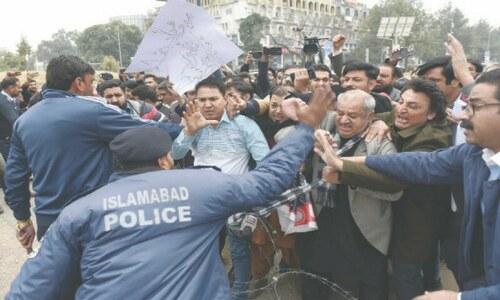ISLAMABAD: The government on Thursday stopped procurement of around 1,100 vehicles for employees of the Federal Board of Revenue (FBR) till the finalisation of an investigation into allegations of malfeasance, threats to the whistleblowing senator and raids on a rival car manufacturer.
This was the crux of a meeting of the Senate Standing Committee on Finance & Revenue in which the finance minister pledged to stick to a commitment made to the International Monetary Fund (IMF).
Senator Saleem Mandviwala chaired the meeting.
A major part of the discourse centred around the “scandalous” purchase process of 1,010 vehicles by FBR for its field staff. The number of cars was subsequently raised by another 70, taking the total number to 1,080.
Senator Vawda says he has received death threats from FBR officials for ‘whistleblowing’
Senator Faisal Vawda, who had raised question marks over the procurement process during the panel’s previous meeting on Jan 22, kept on making further allegations.
He alleged before the senate committee that he had received “death threats from FBR officers for whistleblowing”, naming three senior officials.
In addition, he alleged the FBR had raided the offices of Toyota Indus Car Company after he (Vawda) spilled the beans.
In a statement, the Senate secretariat quoted Faisal Vawda as saying “FBR officers Ali Saleh Hayat, Shahid Soomro and Dr Hayat Siddiqui threatened me”.
The senator had actually named the third officer as Sajjad Siddiqui.
In response to these allegations, FBR Chairman Rashid Mehmood Langrial pledged to halt the procurement process and promised a high-level investigation into all the allegations. He, however, requested that allegations pertaining to life threats to the senator should be referred to the Federal Investigation Agency (FIA).
Mr Langrial said the procurement process for the vehicles would be halted until a review was completed. The FBR’s internal investigation would be presented to the Senate panel and “we’ll be happy if the panel decides to get the investigation conducted from an external agency”.
The FBR chief said there was a critical need for FBR to identify non-filers and implement effective a enforcement mechanism to ensure compliance, but it was not possible without visiting markets and territories due to a cash economy.
“We have 25 tax offices and each office covers many districts.”
He told the panel that one of the FBR’s committees on procurement of vehicles was led by Member Inland Revenue Operations Dr Hamid Ateeq Sarwar and comprises nine other officers, including the bureau’s former chief, Amjad Zubair Tiwana.
Senator Saleem Mandviwala stressed the importance of transparency in the procurement process and called for the Public Procurement Regulatory Authority’s (PPRA) board of directors to review the vehicle purchase in line with the rules. “Procurement cannot be done without PPRA rules,” he affirmed.
Carbon tax
The committee later took up the matter of converting certain taxes into a carbon tax, a proposal made by Senator Sherry Rehman. While the finance minister acknowledged the World Bank’s Country Partnership Framework, which includes climate and carbon concerns, some members raised concerns about the impact of a carbon tax on inflation and its effect on the poor.
The committee stressed the need for reforms to reduce the administrative burden on taxpayers, but at the same time ensuring that tax collection remains efficient and fair.
The committee recommended to send several matters, including the vehicle procurement issue, to the FIA.
The meeting discussed ongoing training programmes for FBR officers, which have been in place for over 20 years. Senator Mandviwala questioned the effectiveness of these programmes, wondering “what has been achieved from the training provided to FBR officers”.
Finance Secretary Imdadullah Bosal assured the panel that it would be briefed about the training scheme.
Revenue shortfall
The committee was told the current revenue shortfall stood at Rs384 billion for the first half of the fiscal year as the FBR collected Rs5.624 trillion against a target of Rs6.008tr.
The tax-to-GDP ratio has risen to 10.8 per cent in the second quarter, up from 9.5pc in the first, although it remained below the IMF-agreed target of 13.6pc by the end of the programme.
By comparison, India’s tax-to-GDP ratio stands at 18pc.
Published in Dawn, January 31st, 2025














































